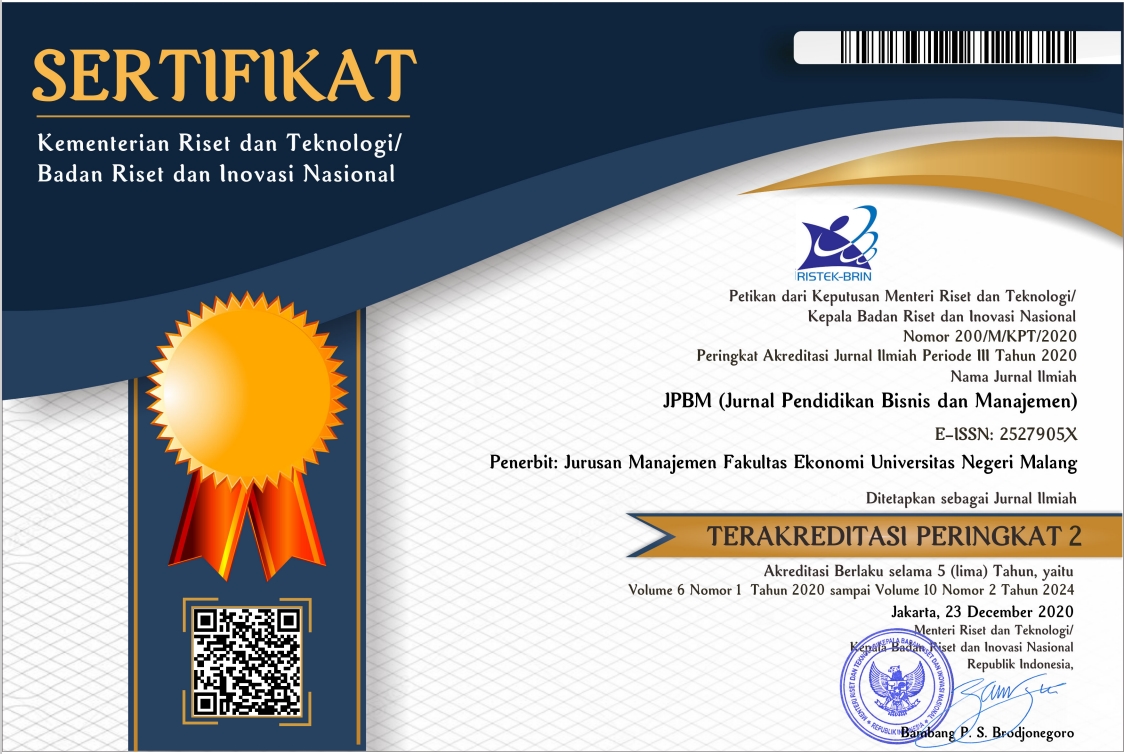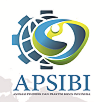Problem-Based Learning and Learning Styles: The impact on Student’s Learning Outcomes
Abstract
Keywords
Full Text:
PDFReferences
Amir, T. 2009. Inovasi Pendidikan Melalui Problem Based Learning. Jakarta: Prenada Media Group.
Andersen, A.L., Brunoe, T.D., Nielsen, K., 2019. Engineering education in changeable and reconfigurable manufacturing: Using problem-based learning in a learning factory environment. Procedia CIRP 81, 7–12. https://doi.org/10.1016/j.procir.2019.03.002
Bajaj, R., Sharma, V., 2018. Smart Education with artificial intelligence based determination of learning styles. Procedia Comput. Sci. 132, 834–842.
https://doi.org/10.1016/j.procs.2018.05.095
Bayona, J.A., Castañeda, D.I., 2017. Influence of personality and motivation on case method teaching. Int. J. Manag. Educ. 15, 409–428.
https://doi.org/10.1016/j.ijme.2017.07.002
Belousova, A., 2014. Thinking Style as a Factor of Variable Cognitive Education. Procedia - Soc. Behav. Sci., LUMEN 2014 - From Theory to Inquiry in Social Sciences, Iasi, Romania, 10-12 April 2014 149, 97–101.
https://doi.org/10.1016/j.sbspro.2014.08.167
Bota, O.A., Petre, C., 2015. Educational Style Impact on Student Academical Achievements. Procedia - Soc. Behav. Sci., First Global Conference on
Contemporary Issues in Education (GLOBE-EDU 2014) 12-14 July 2014, Las
Vegas, USA 177, 127–131. https://doi.org/10.1016/j.sbspro.2015.02.360
Chou, D.C., 2018. Applying design thinking method to social entrepreneurship project. Comput. Stand. Interfaces 55, 73–79.
https://doi.org/10.1016/j.csi.2017.05.001
Donnell, Z., Hoffman, R., Sarmiento, K., Hays, C., 2018. Concussion attitudes, behaviors, and education among youth ages 12–17: Results from the 2014 YouthStyles survey. J. Safety Res. 64, 163–169.
https://doi.org/10.1016/j.jsr.2017.12.001
Huang, T.-C., 2018. Do different learning styles make a difference when it comes to creativity? An empirical study. Comput. Hum. Behav.
https://doi.org/10.1016/j.chb.2018.10.003
Liu, L., Du, X., Zhang, Z., Zhou, J., 2019. Effect of problem-based learning in pharmacology education: A meta-analysis. Stud. Educ. Eval. 60, 43–58. https://doi.org/10.1016/j.stueduc.2018.11.004
Magdalena, S.M., 2015. The Relationship of Learning Styles, Learning Behaviour and Learning Outcomes at the Romanian Students. Procedia - Soc. Behav.
Sci. 180, 1667–1672. https://doi.org/10.1016/j.sbspro.2015.05.062
Matewos, A.M., Marsh, J.A., McKibben, S., Sinatra, G.M., Le, Q.T., Polikoff, M.S., 2019. Teacher learning from supplementary curricular materials: Shifting instructional roles. Teach. Teach. Educ. 83, 212–224.
https://doi.org/10.1016/j.tate.2019.04.005
Mubuuke, A.G., Louw, A.J.N., Van Schalkwyk, S., 2017. Cognitive and Social Factors Influencing Students׳ Response and Utilization of Facilitator Feedback in a Problem Based Learning Context. Health Prof. Educ. 3, 85–98.
https://doi.org/10.1016/j.hpe.2016.09.003
Munastiwi, E., 2015. The Management Model of Vocational Education Quality
Assurance Using ‘Holistic Skills Education (Holsked).’ Procedia - Soc. Behav.
Sci., The 4th World Congress on Technical Vocational Education and Training (4thWoCTVET), 5-6 December 2014, Universiti Tun Hussein Onn Malaysia, MALAYSIA 204, 218–230.
https://doi.org/10.1016/j.sbspro.2015.08.144
Mynott, G.J., 2018. The academic self-concept of business and management students: A review of the literature. Int. J. Manag. Educ. 16, 515–523.
https://doi.org/10.1016/j.ijme.2018.10.003
Phungsuk, R., Viriyavejakul, C., Ratanaolarn, T., 2017. Development of a problembased learning model via a virtual learning environment. Kasetsart J. Soc.
Sci. 38, 297–306. https://doi.org/10.1016/j.kjss.2017.01.001
Stekelenburg, J.J., Vroomen, J., 2015. Predictive coding of visual–auditory and motor-auditory events: An electrophysiological study. Brain Res., Predictive and Attentive Processing in Perception and Action 1626, 88–96.
https://doi.org/10.1016/j.brainres.2015.01.036
Tutticci, N., Coyer, F., Lewis, P.A., Ryan, M., 2016. High-Fidelity Simulation: Descriptive Analysis of Student Learning Styles. Clin. Simul. Nurs. 12, 511–
https://doi.org/10.1016/j.ecns.2016.07.008
Wyness, L., Dalton, F., 2018. The value of problem-based learning in learning for sustainability: Undergraduate accounting student perspectives. J. Account.
Educ. 45, 1–19. https://doi.org/10.1016/j.jaccedu.2018.09.001
Yew, E.H.J., Goh, K., 2016. Problem-Based Learning: An Overview of its Process and Impact on Learning. Health Prof. Educ. 2, 75–79.
https://doi.org/10.1016/j.hpe.2016.01.004
DOI: http://dx.doi.org/10.17977/um003v5i32019p113
Refbacks
- There are currently no refbacks.
JPBM (Jurnal Pendidikan dan Bisnis Manajemen) is licensed under a Creative Commons Attribution-NonCommercial-ShareAlike 4.0 International License.
JPBM (Jurnal Pendidikan dan Bisnis Manajemen) is abstracted and indexed in :
















